All Hands on Deck, World Environment Day 2020 – Humanity at the Crossroads
Human civilization has been put on notice. And the fundamental issue of our time is the climate crisis. This climate emergency integrates so many of our present-day concerns with issues of economic sustainability, energy production, and social responsibility We are literally at crossroads.
We need to seriously reflect on our systems of social, political, and economic choices and how best we are responding to the enormous problems that have been and continue to be created by this climate crisis?
We cannot limit ourselves to a single solution if we are to avert this climate crisis. It will require the rigor of scholarly input, a sober analysis of our environmental bodies, a strong political will but most important of all, a massive resounding and civic awakening in response to this monumental challenge. As the voices of global environmentalists develop a consensus on clean energy resources, countries like Uganda are just getting excited about the discovery of oil as an economic saviour. Therefore, a variation of solutions needs to be tabled on how to effectively respond, how to transform our organizational setup, recognizing the need for new ecocultural collaborations, recognizing interspecies codependency, and frankly, spiritual awakening to the dire fate of our "Common home."
Specific to Uganda, among many solutions, and in response to this crisis, is the awakening of not only the youth but also children as spirited activists in this effort. A lot more needs to be done to bolster the civic imperative of non-government actors in the pursuit of a better, cleaner, and sustainable environment.
As the world continues to get ravaged by the COVID-19 pandemic, we still have to maintain some semblance of civility and order. 5th June will see humanity celebrate World Environment Day with a call to humanity to respect Nature and its Biodiversity.
With a constant concerted push to keep fossil fuels in the ground, advocacy for alternative renewable sources of energy, and the urgent need to beat plastic pollution as well as plant more trees humanity needs to step up her efforts with precision and diligence. Without this concerted effort, locusts and rising water levels from our lakes and rivers will be the least of our worries.
For this reason, Uganda’s Little Hands Go Green in partnership with 350Africa.org, NEMA Uganda, the National Forestry Authority Uganda and the Deputy Speaker of Parliament in Uganda is hosting a candid virtual workshop about Nature and Biodiversity and our role as the human race to ensure it is preserved on June 05th.
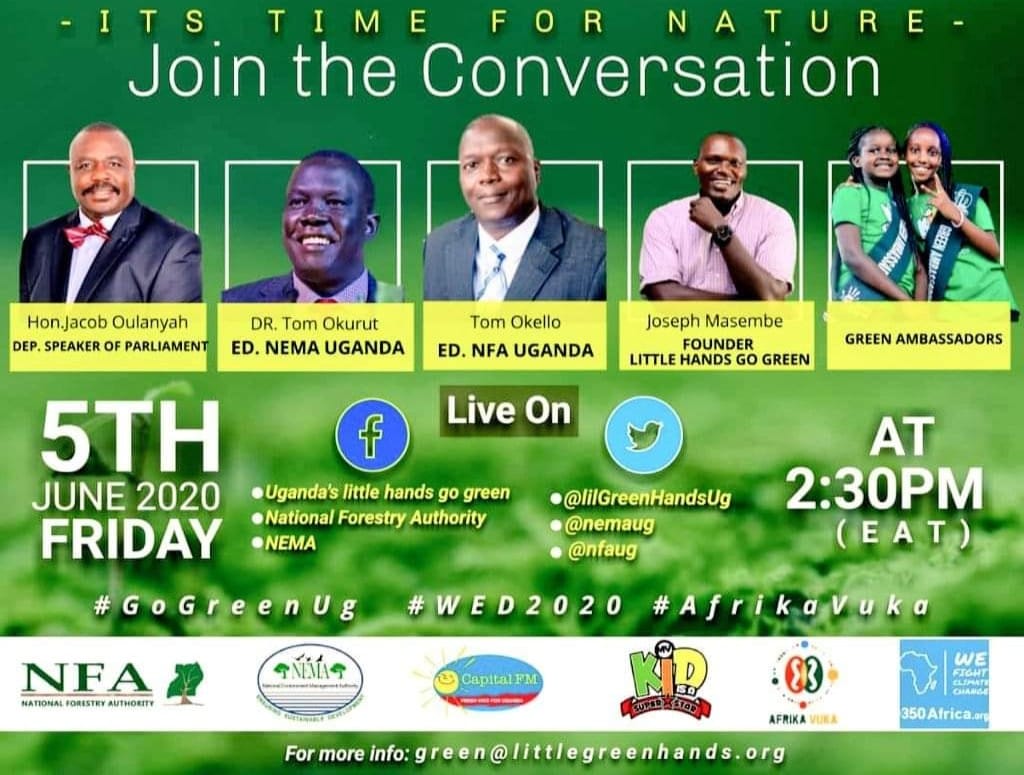
This online conversation will start at 2.30 pm East African time and will be streamed live on various social media pages including the 350Africa Facebook page, Uganda’s Little Hands Go Green Facebook and Twitter handles as well as the NEMA Uganda pages.
Join us and let’s share our voice of change and reason with the very custodians of our environment.
By Joseph Masembe, founder and team leader of Little Hands Go Green.
The AfrikaVuka Caravan
All across Africa, frontline communities have been stepping up to demand action on climate change from their local leaders not only to protect their environment but also their culture and livelihood.
On May 25th 2019, 350Africa.org in collaboration with many frontline community organizations all across the African continent launched the AfrikaVuka platform with the intent of creating a space where these communities could exchange skills, tactics and show solidarity to each other by getting a deeper understanding of each others campaigns and resistance to climate change and how they can offer each other support.
From May 28th to August 6th, 350Africa.org under the Afrika Vuka platform will be organizing a series of 6 out-of-the-box webinars dubbed the Afrika Vuka Caravan, which takes the form of a virtual caravan running through Kenya, Senegal, Ghana, DRC, SA and Uganda telling the stories of the iconic campaigns in these countries. The webinars will draw upon the collective need to protect the planet by enabling people from across the continent to offer support, lend a voice and show solidarity to these campaigns and the people on the frontlines of these struggles despite the distance brought about by not only geography but also social distancing owing to the global coronavirus pandemic.
The AfrikaVuka Caravan will highlight: stopping the Bargny Coal Plant in Senegal, pushing for fracking to be banned in South Africa, halting the proposed Coal Powered Plant in the exquisite Lamu, Kenya, stopping oil exploration in the iconic Virunga Park in DRC, amplifying the need for renewable energy solutions in Ghana and last but most definitely not least pushing the Standard Bank to not finance the proposed crude oil pipeline that will cut across Uganda and Tanzania.
We are stronger and steadier together, and by lending our voices we can transform our continent by demonstrating that development can take place while protecting our earth, culture, and our people. Let us keep building resilience against the fossil fuel nightmare and Vuka (Rise Up) to a brighter future lit by renewable and sustainable sources of energy.
Author: Rukiya Khamis, 350Africa.org Anglophone Field Organiser.
Stronger than Covid-19
Many of us are dealing with uncertainty, fear, loss of livelihoods, and anxiety about the future. Some of us are doing our best to adapt. And many of us are looking for ways to help each other. In these unprecedented and challenging times, caring for one another is the highest priority.
As the world continues to trap in to help slow the spread of Covid-19, one of the most interesting phenomena taking place is the creative, quirky, and inspiring ways from people across Africa and beyond to cope with the pandemic.
We recently asked a few of our organisers to talk about how they're dealing with being quarantined at home.
There are so many parallels between the climate crisis and the global COVID-19 pandemic. It’s global in scope. Historically marginalized communities are the most impacted. And corporations, including Big Oil, are trying their hardest to push politicians to put profit before people.
Many of us are longing for lockdowns to end and normal life to return. But we need to remember that “normal” was already a crisis. “Normal” was greed and inequality, poverty, destruction of nature, and climate breakdown.
Despite the growing uncertainty that produces all kinds of feelings in us and our communities, this is not the time to be discouraged. This is rather an opportunity to respond creatively, to take care of each other, and to demonstrate solidarity with the most vulnerable and affected ones.
The period of rebuilding and recovery after the Covid-19 crisis opens up choices, and we need to choose to build back a better and more just world. Our covid-19 response must put people and the planet – not corporations and polluting industries – first. It’s time to demonstrate Ubuntu values and that together Africans are stronger than COVID-19. It’s time for a Just Recovery from COVID-19.
We would also like to hear from you: tell us what’s going on in your neighbourhood, or community. How are you coping and responding? Your knowledge and experience can help many across the world. Send us a picture and/or a video.
By Landry Ninteretse, 350Africa.org Managing Director.
Ugandan communities concerned over oil’s deal amid COVID-19 crisis
The Government of Uganda has applauded the recent agreement that will see Tullow Oil Plc transferring its assets for Lake Albert Development project and the proposed East African Crude Oil Pipeline System to Total Uganda at $575 million (Sh57.5 billion).
According to the Minister of Energy and Mineral Development, “it is a critical development that takes the (Oil and Gas) sector towards the Final Investment Decision (FID) that the country is eagerly waiting for”.
That joy isn’t however shared with communities in Western parts of Uganda. They are deeply concerned that if the Ugandan government allows the presence of oil activities in the eco-sensitive areas such as the Ngaji block which have been put up for bidding to the investors, their lives will be ruined because they have depended on the tourism for their livelihood which will disappear.
If the government allows the oil exploration in the Ngaji oil block, which is located in the ecosensitive Lake Edward and Queen Elizabeth National Park (QENP), this seriously will put such sensitive ecosystems at risk, triggering the slow but certain disappearance of the rich ecological, economic and social importance of such ecosystems. Agriculture, fisheries, tourism, and other income-generating activities for local communities are also likely to be negatively impacted.
Communities and activists are also worried about oil exploitation activities will also result in the generation and release of greenhouse gas emissions into the atmosphere, which goes against the 2015 Paris Climate Change Agreement ratified by Uganda.
As the world is going through a terrible situation of preventing and ending global coronavirus pandemic, Uganda, like all other signatories to the Paris Agreement should be more concerned about a Just Recovery Plan that focuses on health emergencies, addresses the urgent needs of people and support public health systems currently under severe strain. As of April 26th, the country has a total number of 75 COVID-19 confirmed cases.
By Edwin Mumbere - Kasese
Defending the Defenders
Last week Ugandan environmental defenders working around issues of environment and extractives met in Kampala for a 5-day workshop on risk assessment and security planning. The workshop was organized by Defend Defenders.
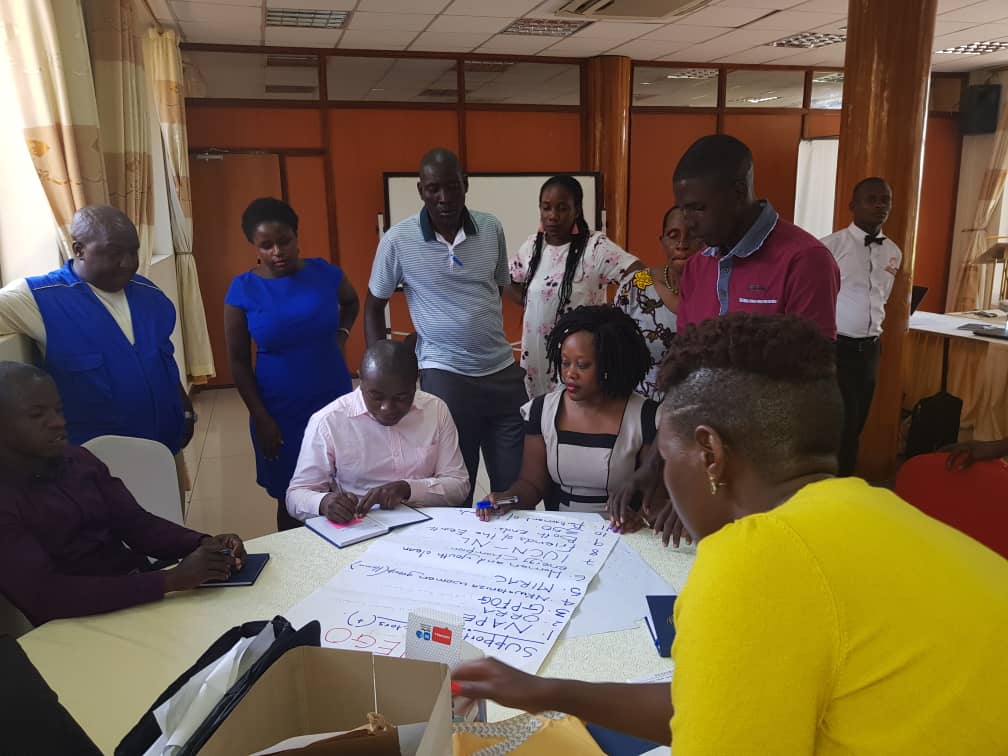
Five organizations working in the environment and extractives were present at the training that aimed at equipping participants with basic knowledge and skills on physical and digital security alongside empowering the participants to conduct security risk assessments and to identify strategies that would help them mitigate risks.
The workshop was inspired by a risk assessment done by DefendDefenders of the organizations that participated in the court case against Total for alleged human and environmental rights violations triggered by its operations in Uganda. Total is one of two operating companies of the Lake Albert Oil Project, together with China National Offshore Oil Corporation (CNOOC), and of the giant pipeline EACOP project., The risk assessment concluded the need to build the capacity of the organizations involved in order to ensure they are ready to prevent and respond to any security threats related to their work.
This comes a few weeks after a similar gathering organized by 350.org took place in Brazil that brought together climate defenders from 5 continents and 23 countries whose aim was to equip participants involved with similar skills and capacity related to safety, resilience and cross-regional solidarity.
Adentan Municipality contributes towards the 100% renewable energy in Ghana
‘Has anyone gone up North of Ghana? Some parts of our country are getting warmer and one of the objectives of the International communities is to reduce the earth’s overall temperature by 1.5 degrees, it is each of our responsibility to ensure we maintain Ghana’s NDCs and offer our contribution to solving the climate crisis” said Mr Foster Gyamfe of the Ministry of Finance Economic Strategy and Research division, at a workshop organized by 350 GROC at Adentan Municipal Assembly. Mrs Gifty Owusu - Nhyira of the Ecobank Ghana an accredited entity to the Green Climate Fund (GCF) lauded the initiative of the GROC Team “our doors are open to review and advise on any climate intervention projects from this workshop”
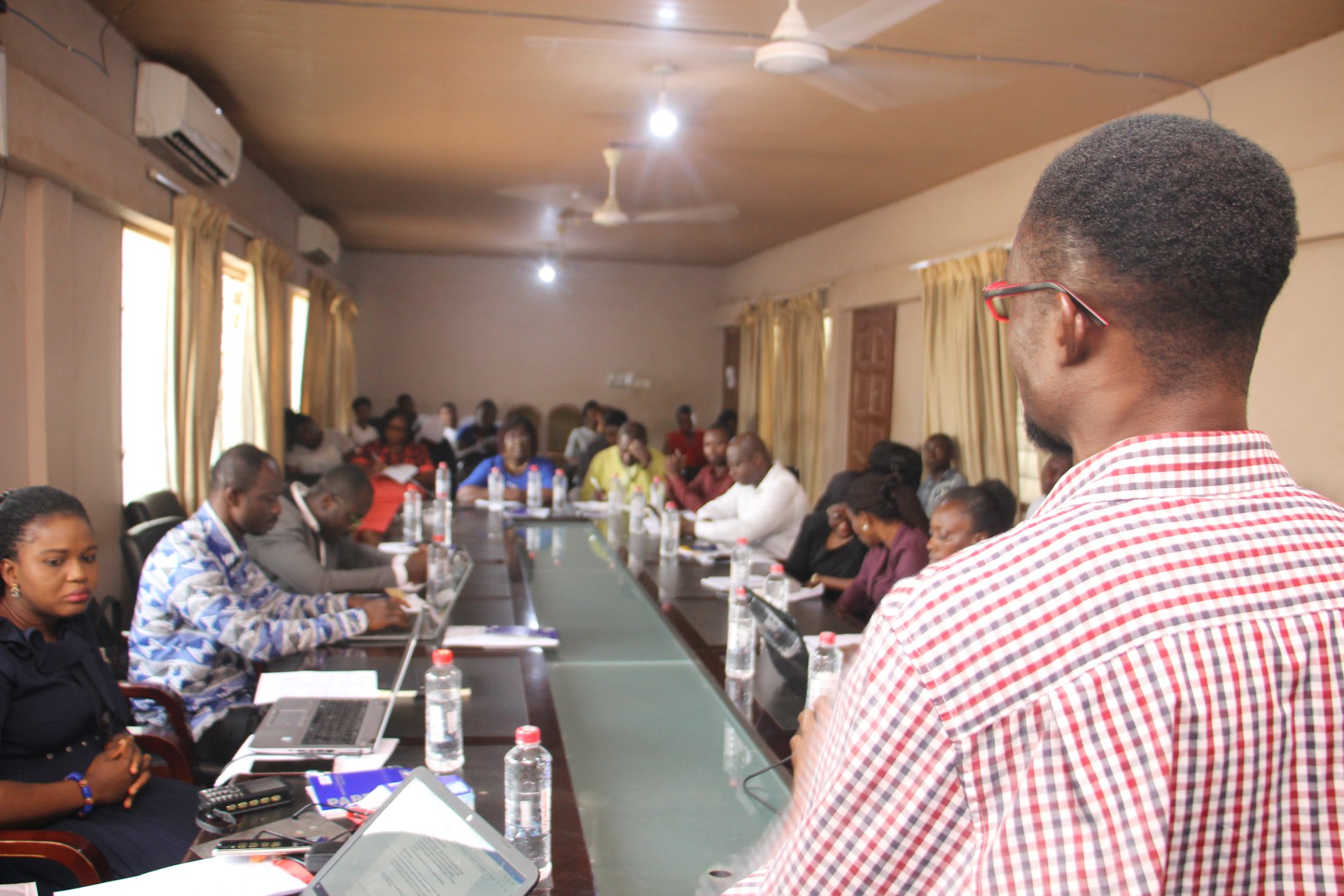
The workshop was held as part of the Renewable Energy for Communities (RE4C) campaign by 350 GROC and it brought together 40 participants, that is,25 members from the district and 15 partners. The workshop offered a space to discuss the present renewable energy plans in the Municipality, the failures and successes in the implementation of the pre-existing plans and finally the GROC team worked alongside the community to draft the renewable energy plan of the Adentan Municipality that is more viable.
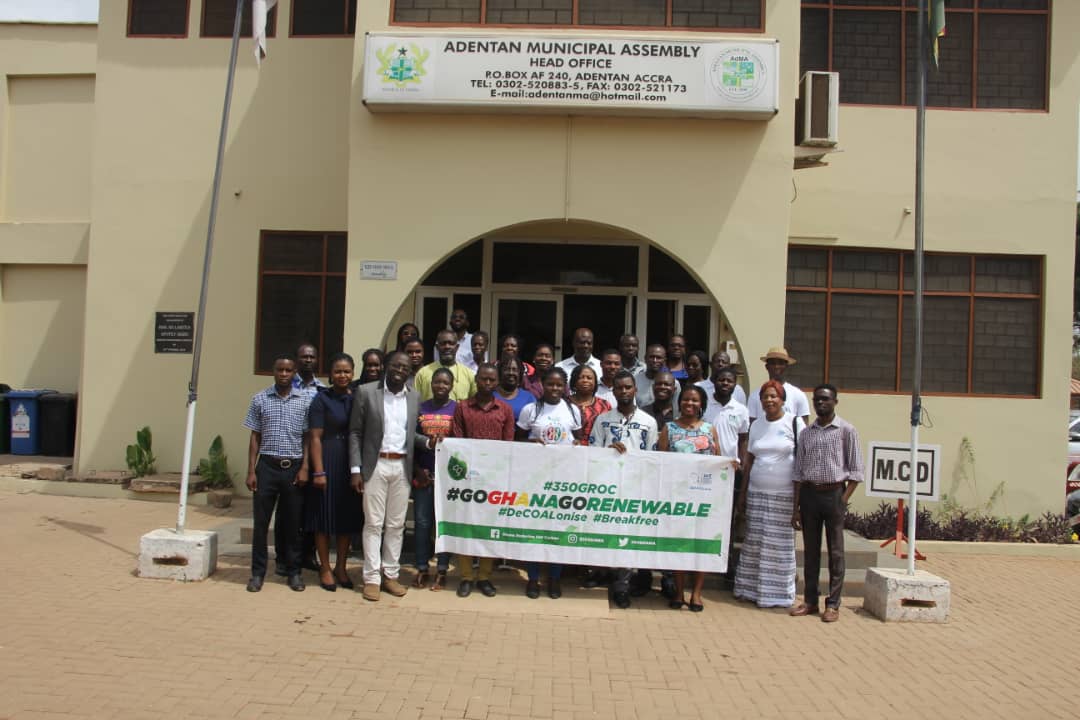
Adentan Municipality is amongst the 5 districts in Ghana that 350 GROC is working with for this phase of the Renewable Energy for Communities (RE4C) campaign. Success in the incorporation of the 5 district renewable energy plans in the existing Medium Term Development Plans, would be another milestone for 350 GROC after a long fight to stop the establishment of coal-fired power plants in Ghana, as it endeavours to promote nationwide renewable energy awareness geared towards sustainable development.
People of Onupi and Nigeria do not need coal
“I want the Federal Government to intercede for us so our women won't experience miscarriage again". "If the government was providing social amenities to community members, then we would have never accepted the destructive coal mining activities". Those are words of respectively Mrs Agagwu Rachel and Mr Alfa Stephen, the chairman of Onupi Coal Committee when attending the civil society meeting organized by GIFSEP and partners like International Center for Investigative Reporting (ICIR), Heinrich Boll Foundation, Climate and Sustainable Development Network and Global Rights to mark World Social Justice Day.
The meeting was an opportunity for community leaders and civil society groups to strategize on the way forward in ensuring the voices of the community members in both Kogi and Gombe states are heard and to advocate for a coal-free society that keeps social justice and safety at the forefront.
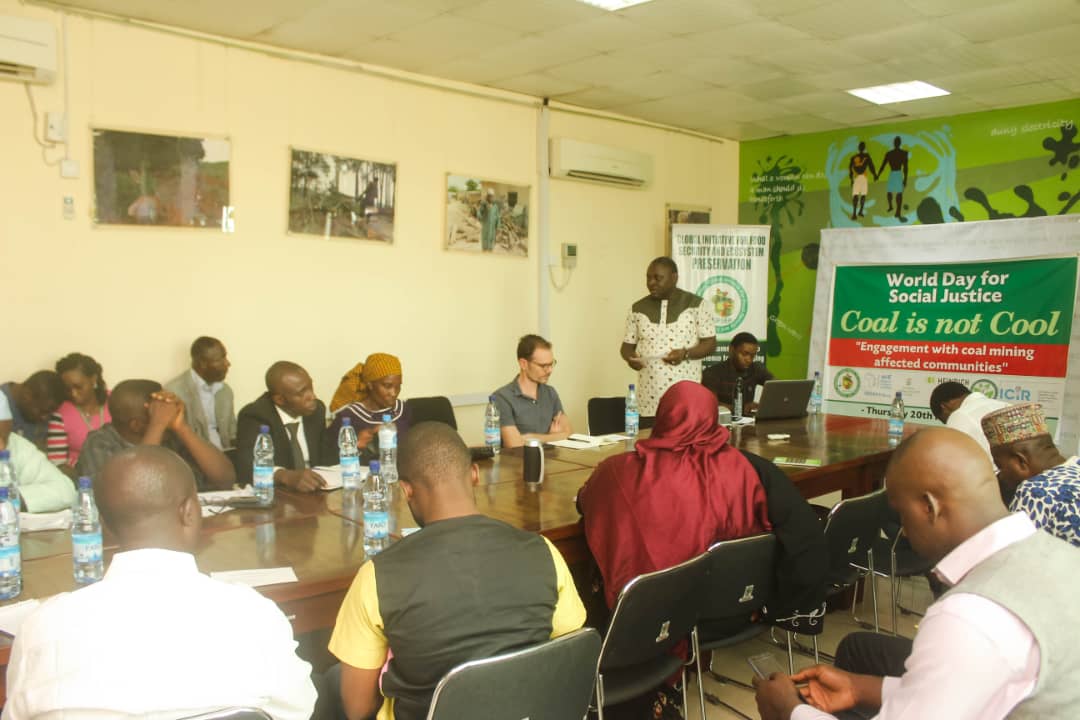
The gathering was inspired by a research GIFSEP did last year to ascertain the status of coal mining and to identify the actors and financiers of coal mining in Nigeria. The research carried out by the International Center for Investigative Reporting (ICIR) in Kogi and Gombe states with support from 350.org was a response to the shift in fossil fuel investment caused by Nigeria’s yawning gap in power generation and supply, which prompted many stakeholders including the members of the National Assembly to demand coal-powered stations.
This research revealed serious troubling impacts local communities are now confronted due to the activities of Dangote coal mine. These impacts include the destruction of water sources contamination of alternative borehole sources, health issues like high rates of miscarriage. More detailed information about the research’s findings can be viewed here.
Community members of Kogi and Gombe states alongside others in Nigeria intend to continue raising their voices to ensure their right to a clean and healthy environment filled with sustainable prosperity. According to participants, the meeting was just the beginning of the journey towards a coal-free Onupi and Nigeria.
Climate Defenders gathering: Towards a consolidated strategy
Fifty climate defenders and activists from 23 countries gathered in Curitiba, Brazil from February 5th to 8th to share the stories of their struggles and to build a stronger community of climate defenders.
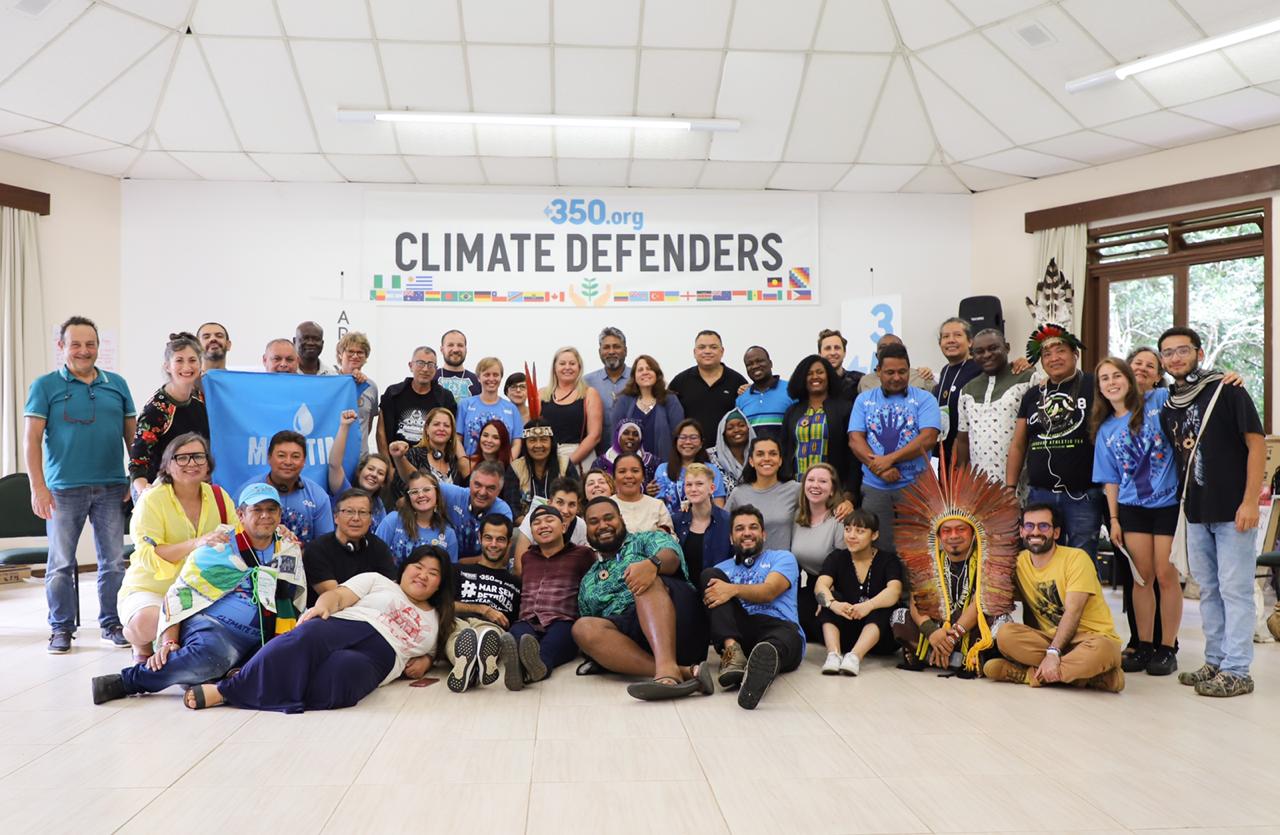
Everywhere climate defenders are facing threats, intimidation, and increased repression as they protect the planet from destruction. In most cases, the fossil fuel industry is responsible for the most severe and disturbing violations of human rights. This gathering provided a space to share experiences, skills and tactics and build a coherent strategy for reacting to crisis moments, including increased visibility, communications strengthened leadership, rapid response and building alliances of legal support.
African representatives at the gathering shared the most common threats they are confronted with, including intimidation by government officials and police, restricted movements and surveillance, forced removal of communities and sometimes verbal abuse by being labelled for instance as ‘anti-development’ activists. They denounced the fossil fuel companies working hand in hand with corrupt politicians, security forces and sometimes private militia in perpetrating such disturbing violations of human rights and freedom.
During the gathering, 350.org launched the Climate Defenders report on Human Rights Abuses by Fossil Fuel Companies. The report highlighted some specific cases from Africa where companies such as Shell in Nigeria) and Amu Power in Lamu (Kenya) are involved. The report shows successful strategies that activists are taking to fight these cases.
"Chevron-Texaco and Shell are directly responsible for more than 45,000 deaths caused by health issues, the displacement of 60,000 people and the dump of more than 18 billion gallons of toxic wastewater into rivers" #AfrikaVuka https://t.co/nGJjxGuVyZ pic.twitter.com/h4ZFDvYQ74
— Christian (@christroi10) February 7, 2020
By targeting the fossil fuel industry, climate activists are attacking directly the heart of the climate crisis. They are not only defending life and nature but also pushing back the increased repression on civil society groups while exposing the liability of the fossil fuel industry in human rights abuses.
Among the proposed solutions to strengthen their fights, participants at the gathering suggested cross-regional solidarity between countries with common struggles, working on the existing protocols to strengthen protection mechanisms and ensuring greater connections between climate activists and the wider human rights defenders community.
Author: Christian Hounkannou, 350Africa Francophone Field Organiser.
Kenya and Nigeria joined divestEd!
Divestment from fossil fuels has been gaining quite the momentum globally in the last few years. This week two youth groups in Kenya and Nigeria took action, joining the Fossil Fuel Divestment Day.
On 12th February, students in the Chiromo campus of the University of Nairobi, Kenya engaged in a 1-hour sit-in session. The forum attracted over 40 participants and took the form of a participatory dialogue to exchange on the need to invest in renewable energy in the campus, its advantages, as well as reaching out to other campuses to follow suit. The students, mostly drawn from the Chiromo Environmental Awareness Club and environmental scientists in the making had strong contributions on how renewable energy on campuses could look like, citing the need for academia and researchers to take a lead in implementing solutions to the fight against the climate crisis.
It happened! We are likely the first across the world to host the #divestED event owing to our special circumstances that could not allow us a quorum tomorrow.
Thanks for all students in @ceackenya who hosted us, and keenly contributed to the dialogue. @divesteddotorg pic.twitter.com/jn4zNNShp6
— Y-CEARE (@YCeare) February 12, 2020
Among the emerging issues was the need to have a strong legal requirement that enables campuses and institutions to have renewable energy systems as a part of them going green in energy production and usage. The action was led by Y-CEARE (Youth Coalition for Environmental Advocacy and Renewable Energy), a team part of AfrikaVuka.
In Nigeria, GIFSEP (Global Initiative on Food Security and Ecosystem Preservation) held a workshop on reducing carbon footprint, followed by a mock protest within the university of Abuja, targeting students from the department of geography and environmental management. The team intended to encourage the department to join the ongoing efforts to transition from fossil fuels addiction to renewable energy. Students specifically asked the university administration to switch to renewable energy and install solar panels on top of administrative and campuses blocs.
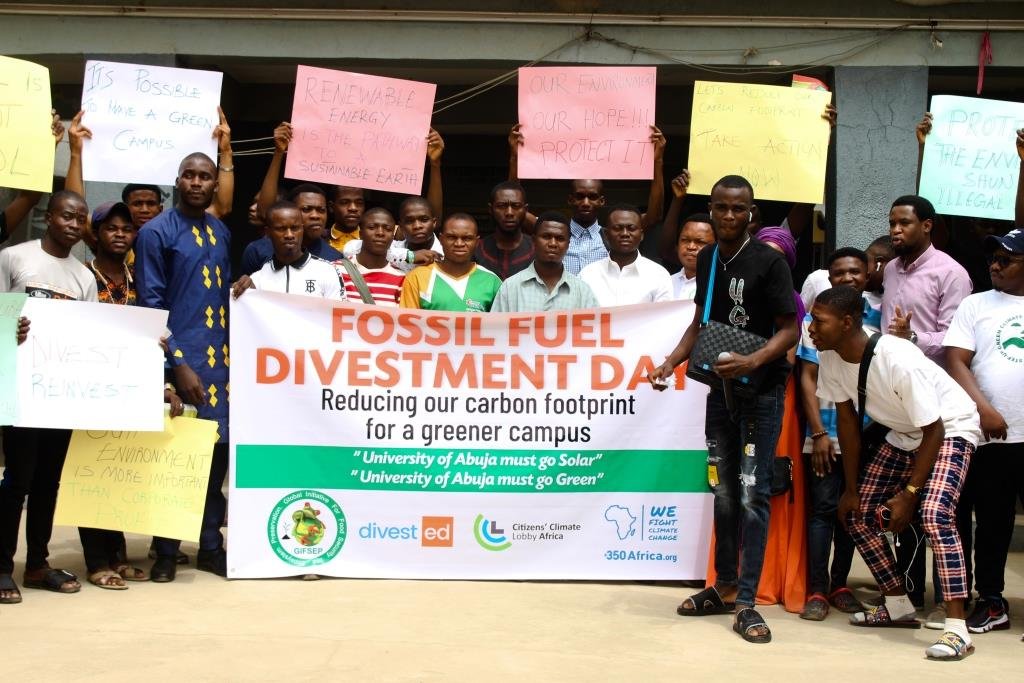
When asked about what to expect after this divestEd initiative, Joseph Ibrahim of GIFSEP said “We are still having issues of unstable electricity supply. We believe this initiative will inspire the students and the university to take on renewable energy and create an example for other campuses and schools and hopefully Nigeria as a whole. ”
I was at University of Abuja today to make a climate change presentation and joined the students to demand for a greener campus #F2D2 #FossilFuelDivestmentDay #Afrikavuka pic.twitter.com/0J1CMcunDl
— Joseph Ibrahim (@joeibro) February 13, 2020
Both teams joined the Fossil Fuel Divestment Day or divestEd, a mobilisation moment led by US divestment students to demand specific institutions to divest from fossil-fueled destruction of land, air, and water and re-invest in renewable energy.
Author: Rukiya Khamis, 350Africa.org Anglophone Field Organizer.
Integrating renewable energy agenda into Accra’s districts development plans
In 2020, 350 Ghana Reducing Our Carbon’s work (GROC) is focused on creating awareness on renewable energy and will be working closely with 5 districts of the Greater Accra to develop local renewable energy plans in their efforts to activate Renewable Energy programming contributing to a substantial impact to Ghana’s Energy Policy by 2030.
This week, GROC hosted a workshop in Ayawaso West Municipal Assembly, which is one of the 260 Metropolitan, Municipal and District Assemblies (MMDAs) and forms part of the 29 MMDAs in the Greater Accra Region.
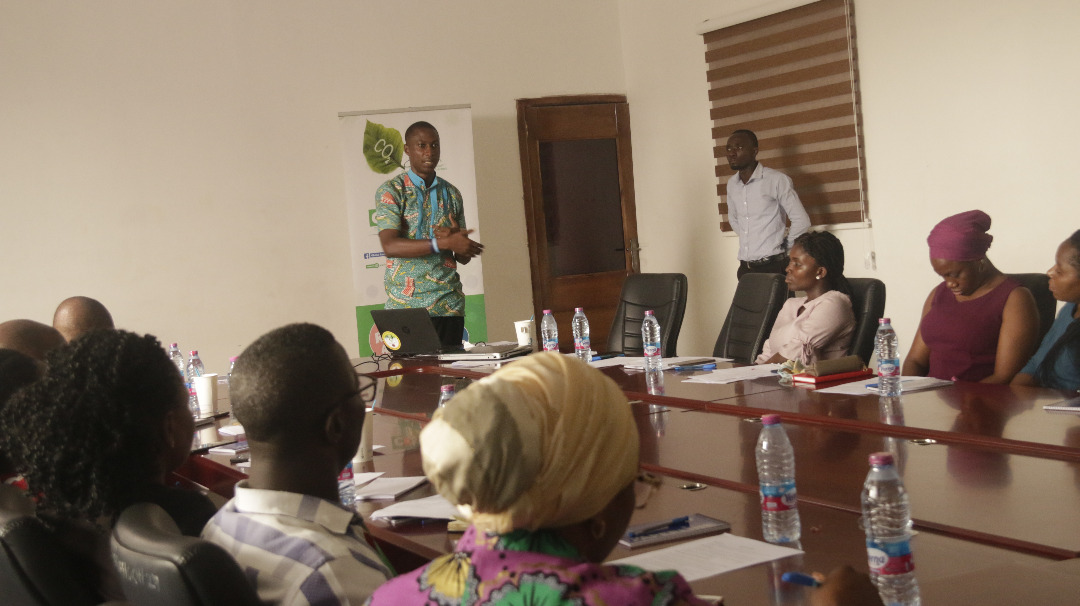
The workshop’s goal was to identify and build partnerships with key stakeholders within that municipality who are working towards the renewable energy agenda and to get insights that would inform the integration of renewable energy section into the Medium Term Development Plan (MTDP) and Action Plan for 2020.
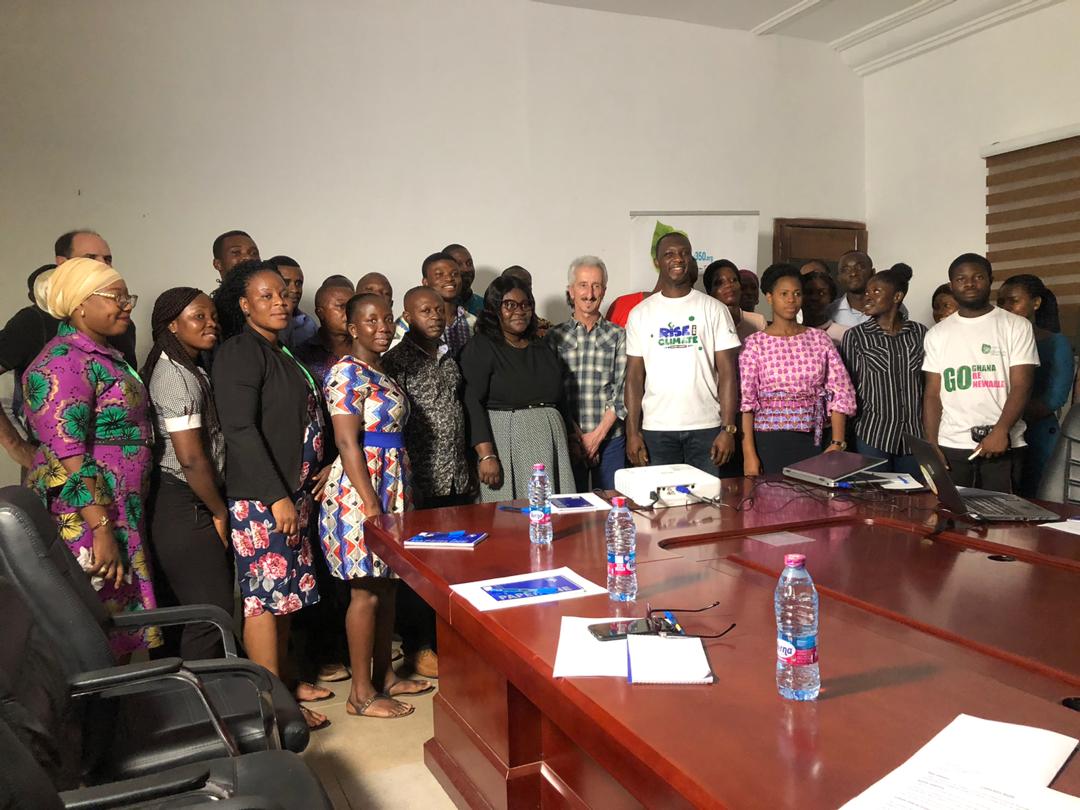
This workshop is the launch of a campaign to get the Renewable Energy agenda integrated into local development plans that will take place throughout the year in four other districts like Ga West Municipal Assembly, Ashaiman district, Accra Metropolitan District and Adentan Municipality.
Author: Rukiya Khamis, 350Africa.org Anglophone Field Organizer
